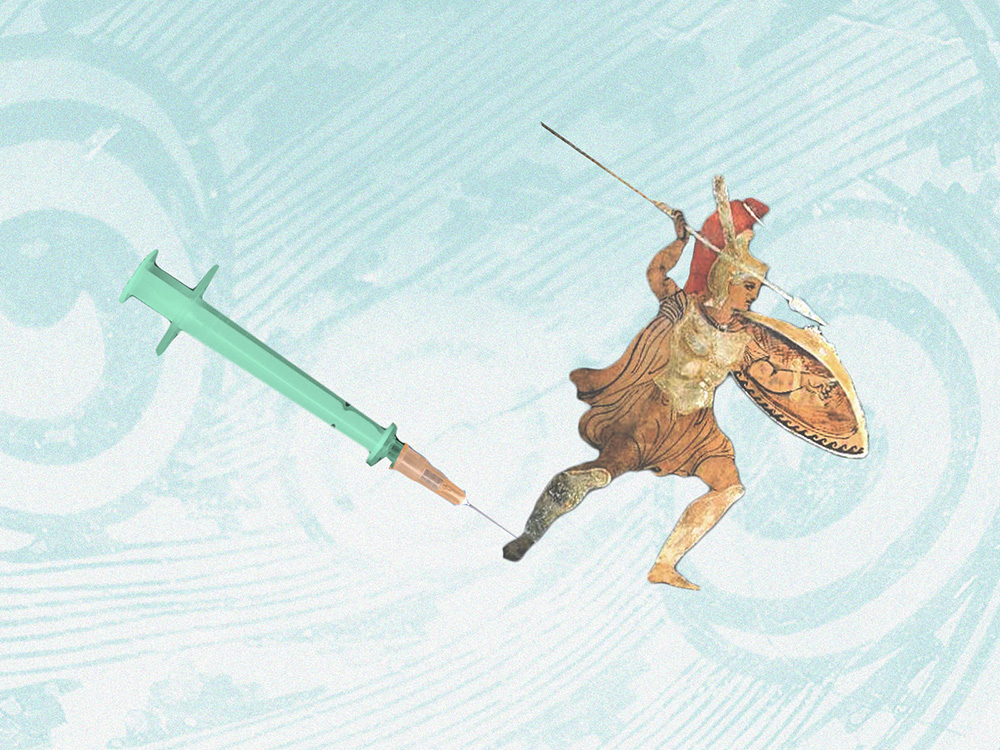Last March, one week into British Columbia’s provincial COVID-19 shutdown, I joined millions of people across the world in an activity contrary to my better judgement. I opened Netflix and watched Contagion, the globally trending 2011 Steven Soderbergh thriller about a novel — and deadly — airborne virus. As my anxiety spiked and the outside world descended into chaos and uncertainty, I craved a story that mirrored our new reality and perhaps offered some indication of what was to come.
Pandemic or not, Contagion is terrifying. The novel virus spreads across the entire world in a matter of weeks, steadily undoing every global system and failsafe in its path. I clenched my jaw as Gwyneth Paltrow’s character foamed at the mouth before being rushed to the hospital where she died within hours. When the looting and fighting over government-distributed food and supplies began, I tried not to think of all the people who had apparently panic-bought toilet paper and butter that very week.
What disturbed me most, though, came midway through the film. A conspiracy theorist and blogger (played by Jude Law) with an online following of millions announces that he has personally verified a homeopathic remedy that successfully treats the illness.
Almost immediately, the pharmacies are overrun as people trample each other to gain access to the limited supply of this supposed remedy. And when a proper vaccine is eventually created, a group of armed robbers breaks into the house of the director of the U.S. Centers for Disease Control and Prevention in an attempt to steal his early doses. Everyone wants a cure, and in the race to secure it, it’s each person for themselves.
It’s a terrifying story, and one that has felt increasingly close to home as the world awaits the COVID-19 vaccines that will, hopefully, relieve us of our current global situation. Here in B.C., the provincial government has announced a phased vaccination timeline with several different groups prioritized. But many will still have to wait several months before their turn, with some already jumping the queue.
Shortly after my viewing of Contagion, I came across something else to feed my pandemic obsession.
American essayist Eula Biss’s On Immunity, published in 2014, could not feel timelier. The book is a meticulously researched and poetically executed treatise on the history, philosophy and sociology surrounding immunity and vaccination. A mixture of science, cultural analysis and memoir, it follows Biss’s own heightened interest in immunization after the birth of her first child during the the H1N1 influenza pandemic.
Biss opens her book with the Greek myth of Achilles, whose mother heard a prophecy that he would die young. In a desperate effort to forestall his fate, Achilles’ mother bathed him in the River Styx — the river that ferries the dead to the underworld — to grant him immortality. She dipped his entire body into the water, but forgot to submerge his heel, which she was holding onto, thus leaving this one part of his body vulnerable. Achilles was later killed by an arrow striking this very spot, hence the famous phrase for a fatal weakness: “Achilles’ heel.”
Biss reads this story from two angles. First, that conferring immunity can be a perilous task, and second, that true immunity is a myth. “No mortal can ever be made invulnerable,” she writes.
These ideas become her guiding convictions as she begins to expose her newborn child to the world and its inherent hazards. They also guide her attempts to understand the complexities of vaccination, and whether or not she should vaccinate her son against the 20-odd illnesses on his infant vaccination schedule.
Discussing her situation with other new parents, Biss discovers that many share the fear that their children will somehow be damaged or contaminated by these vaccines. This leads her to investigate something deeper: how fears around inoculation are tied to the metaphors we use to talk about our bodies and about our world.
“If we source our understanding of the world from our own bodies,” she writes, “it seems inevitable that vaccination would become emblematic: a needle breaks the skin — a sight so profound that it causes some people to faint — and a foreign substance is injected directly into the flesh.”
The language used to describe vaccination is one of violence, she realizes. Brits call it “a jab,” while Americans (unsurprisingly) prefer militaristic language and use “a shot.” Either way, the metaphors that surround the process of inoculation seem to suggest corruption and pollution of the individual body and its assumed purity.
From this understanding of metaphor and its role in fear of vaccines, Biss traces a fascinating history of immunization, beginning with its origin story: vaccae — Latin for “cows.” In the 18th century, when smallpox was still one of the leading causes of death in Europe, it was observed that milkmaids who milked cows with cowpox did not become sick when a wave of smallpox swept through their village.
One pioneering doctor decided to test out what he had observed of this phenomenon and injected his own family — and a group of willing participants — with a small dose of cowpox pus. The next time they were exposed to smallpox, the vast majority of those that had been inoculated with the animals’ illness were not infected.
Vaccination is a much older and more proven process than its detractors will often admit. This becomes one pillar in Biss’s gradual accrual of evidence in favour of the practise. The subtitle of her book is “An Inoculation,” and On Immunity begins by stating that it is not intended to diagnose, treat or prevent any disease, but is instead meant as “an inoculation only against maladies of a metaphorical nature.”
The primary malady Biss confronts is fear. Weaving fluidly between cultural touchstones that express our preoccupation with bodily contamination (Bram Stoker’s Dracula, Rachel Carson’s Silent Spring), Biss subtly builds a case for surpassing it. She addresses and debunks outdated but common concerns around mercury toxicity and vaccines causing autism in children. She also takes great care to understand possible fears around government and Big Pharma’s role in vaccine production and distribution (a timely parallel, given recent concerns around Pfizer’s vaccine delays).
Biss consciously implicates herself in these discussions, especially when she addresses vaccine doubt as it relates to race, gender and class. As an economically privileged white woman, she is highly aware that her demographic comprises one of the primary cohorts of vaccine resisters in the United States.
When she visits a pediatrician recommended to her by a friend, the supposedly “left-leaning” doctor tells her that she doesn’t need to worry about getting the Hepatitis B vaccine for her son because it’s for “people from the inner city.” Racialized poor people, in other words.
Biss weighs this advice, and her socioeconomic position, against what she knows about medical racism affecting Black and Indigenous people and other people of colour, especially those from colonized nations. She draws on examples such as the CIA running a false polio vaccination campaign in northern Pakistan in efforts to gather DNA to verify Osama bin Laden’s location. Or a Vietnamese friend who will not vaccinate her children because she was exposed to Agent Orange in the womb during the Vietnam War, and thus does not trust western public health efforts. Here in Canada, as in the United States, Black and Indigenous people are often denied care when they most need it, and have been subjected to medical practices against their will, such as forced sterilization. There is a lot of history, Biss writes, underpinning vaccine hesitancy among these populations.
She thus argues that it is the social and moral responsibility of white people — like her — for whom vaccination is financially accessible, poses less risk, and is historically less fraught — to vaccinate their children. The decision not to can have profound repercussions on children who can’t be or aren’t vaccinated for valid reasons.
Despite its elliptical structure, On Immunity advances a compelling central thesis: “We owe each other our bodies.” Through her discussion of immunity and vaccination, Biss posits that our individual health is inextricably linked to the collective health of our communities and that we must act accordingly.
It’s something the current pandemic has brought into sharp relief.
Whether it’s mask-wearing, social distancing or isolating at home to protect those who are unable to, the decisions we have made as individuals over these last 11 months have had a direct impact on others, as their own choices have on us. The decision to vaccinate is no different.
“The natural body meets the body politic in the act of vaccination,” writes Biss. “The capacity of some vaccines to generate a collective immunity superior to the individual immunity produced by those same vaccines [a concept called “herd immunity”] suggests that the body politic has not only a body, but also an immune system capable of protecting it as a whole.” Immunity is thus both a private and public trust, but it does not work unless enough people invest. It is something we do for ourselves, but more than anything, for others, to prevent the spread of illness to those most vulnerable.
Biss ends her exploration of language and myth on her own metaphor: immunity as a garden that we tend collectively. Like parenthood, building this garden requires risk, and confronting legitimate fears. It asks of us — all of us, but especially those who hold most privilege — self-sacrifice and responsibility to others.
Reflecting on On Immunity nearly a year after reading it, as we move into the second year of the COVID-19 pandemic, I realize that Contagion’s vaccine wars were only part of the picture. A pharmacy overrun by angry looters is a frightening scene. But perhaps what we should fear more than people knocking each other down to access the vaccine or gaming the system to do so is that not enough people will want it at all.
I hope that most of us will. And that we will vaccinate not just for our own immunity, but for that of the body politic.
What has stayed with me most from this past year is the extremes of humanity it has highlighted. Selfishness, stubbornness and a scarcity mentality on the one hand, and a deepened sense of community, generosity and collective care on the other. On Immunity, with its call to individual morality, may ring somewhat idealistic in a pandemic that has been largely shaped by structural inequity and political ineptitude. But Biss’s appeal is not without its merits. What it means to owe each other our bodies extends beyond the simple act of vaccination to include how we think about our inherent interdependency.
As the pandemic wears on, and we try our best to deal with its reality and the social failings it has exposed, how we protect and care for each other matters. If we haven’t yet learned this lesson, there is still time ahead to do so. ![]()
Read more: Health, Rights + Justice
















Tyee Commenting Guidelines
Comments that violate guidelines risk being deleted, and violations may result in a temporary or permanent user ban. Maintain the spirit of good conversation to stay in the discussion.
*Please note The Tyee is not a forum for spreading misinformation about COVID-19, denying its existence or minimizing its risk to public health.
Do:
Do not: